Louis' Grand Finale
by Ken Smith
Like anyone getting ready for a grand exit, Louis Langrée’s final weeks as Music Director of the Cincinnati Symphony Orchestra are filled with fond recollections and moments of looking ahead.
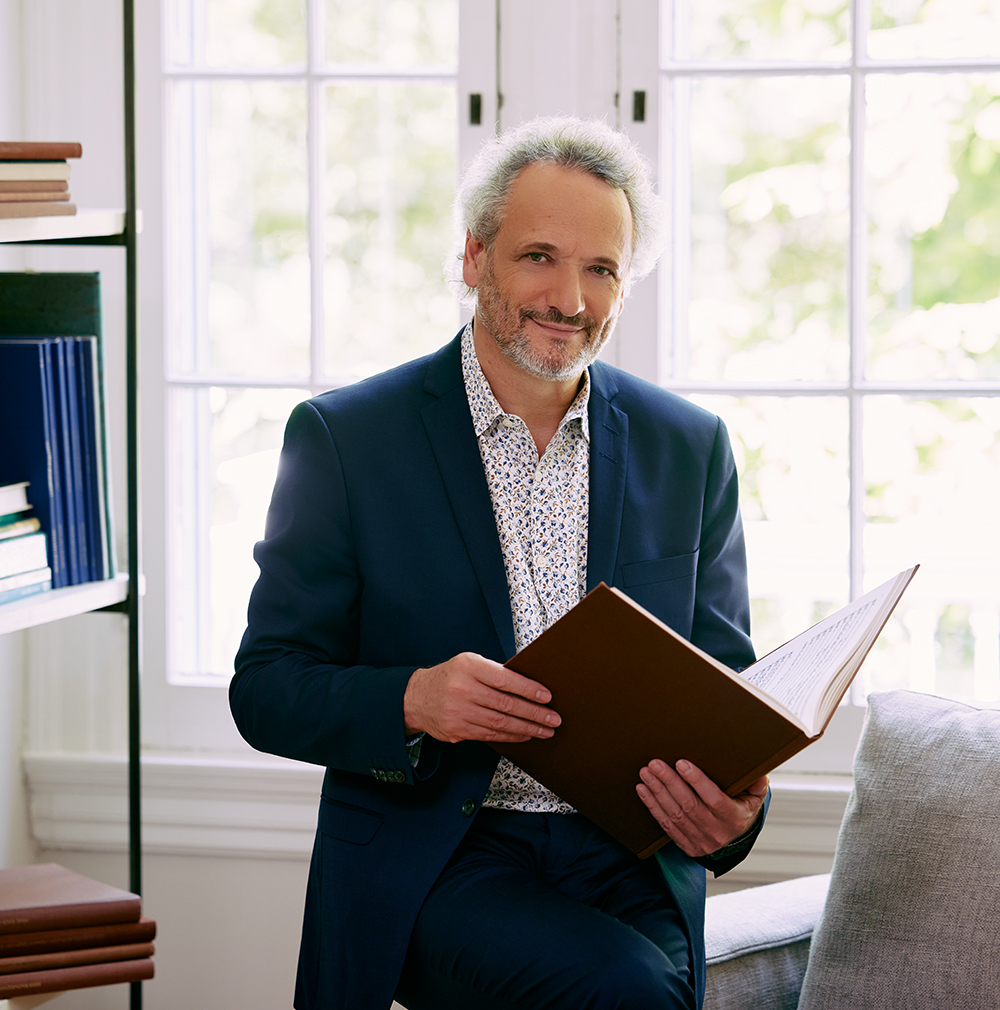
Langrée and the Orchestra have planned a final program to highlight a few fond recollections: Dukas’ The Sorcerer’s Apprentice, which the CSO performed with Langrée on tour in Hong Kong in 2017, and the second suite from Ravel’s ballet Daphnis et Chloé, which had been included in the CSO’s all-French program that reopened Music Hall in 2018, after its extensive renovation.
“Musically, I think this is actually a perfect condensation of what we’ve done together in Cincinnati,” he explains. “We’re performing a great ballet of the early 20th century and also the Dukas tone poem, which might be famous because of Fantasia but really comes from a poem by Goethe. Musically, however, its dimensions are much bigger. Just as Strauss’ Alpine Symphony is a transcendental journey and not some touristic view of the mountains, The Sorcerer’s Apprentice is more than Mickey Mouse with a broom. It’s one of the greatest orchestral pieces ever written, a shimmering lava of sound that perfectly showcases our musicians both individually and collectively.”
■ ■ ■
Nothing looks ahead quite like new music, and on that front Langrée also looks back fondly at his years in Cincinnati, having conducted almost half of the 65 pieces commissioned by the CSO during his tenure. “I’m very proud of those achievements, whether they were world premieres, U.S. premieres or simply works new to Cincinnati,” he says. “I had many guides here who opened up wonderful worlds for me.”
One such guide was Bryce Dessner, a Cincinnati-born composer and member of the Grammy-winning rock band The National, who—perhaps not incidentally—now lives in France, dividing his time between Paris and the Basque Country. “I first met him in Brooklyn,” Langrée smiles with a gleam of recognition. “Now he lives near where Ravel was born.”
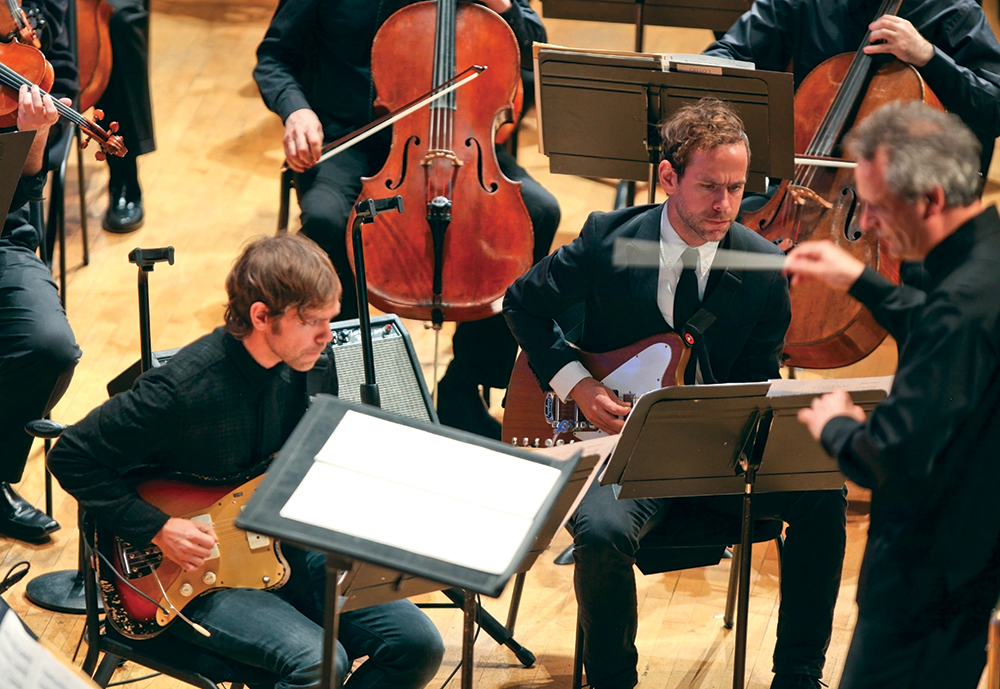
That initial meeting proved quite fruitful for both sides. Since founding MusicNOW in 2006, Dessner had quickly made his recurring event a noted showcase for contemporary musicians from around the world. What MusicNOW soon gained, for several years, was a resident symphony orchestra.
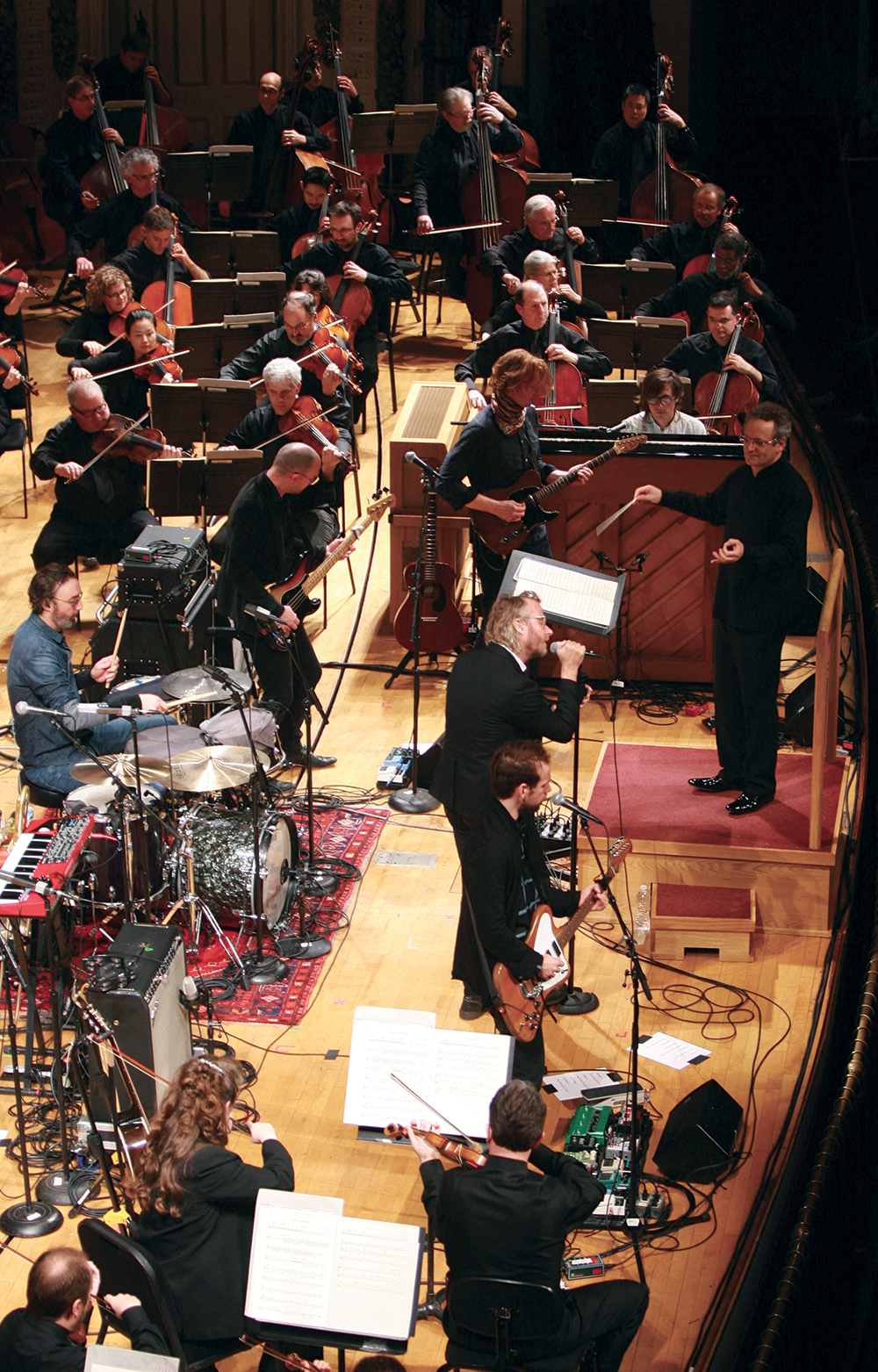
In 2014, the CSO’s first MusicNOW appearance featured Dessner’s Murder Ballades with Eighth Blackbird and St. Carolyn by the Sea, a concerto for two electric guitars with Dessner performing with his twin brother Aaron, along with Scriabin’s The Poem of Ecstasy and the world premiere of Nico Muhly’s Pleasure Ground with baritone Nathan Wyatt. The next night featured both Penderecki’s Polymorphia and Johnny Greenwood’s 48 Responses to Polymorphia, as well as Prokofiev’s Scythian Suite and the world premiere of David Lang’s mountain.
“Looking back now, I can’t imagine how we did it,” Langrée says. “How did we rehearse all these new pieces in a single week? The joy, the energy of mixing those various styles was simply fantastic. And in the audience, you had people who came only to hear the Dessner brothers and discovered Scriabin, and those who came only for Prokofiev and found
David Lang.”
Dessner’s new Piano Concerto, which receives its U.S. premiere on May 2 and 3 with soloist Alice Sara Ott, is a natural—perhaps inevitable—follow-up to his Concerto for Two Pianos (which can be heard on May 3 as part of the CSO Proof concert, Wires), whose 2019 U.S. premiere Langrée also conducted with the CSO and soloists Katia and Marielle Labèque. “Bryce’s new piece, with its obsessive rhythm, is very much in the same musical language as the piece he wrote for the Labèque sisters,” he says.
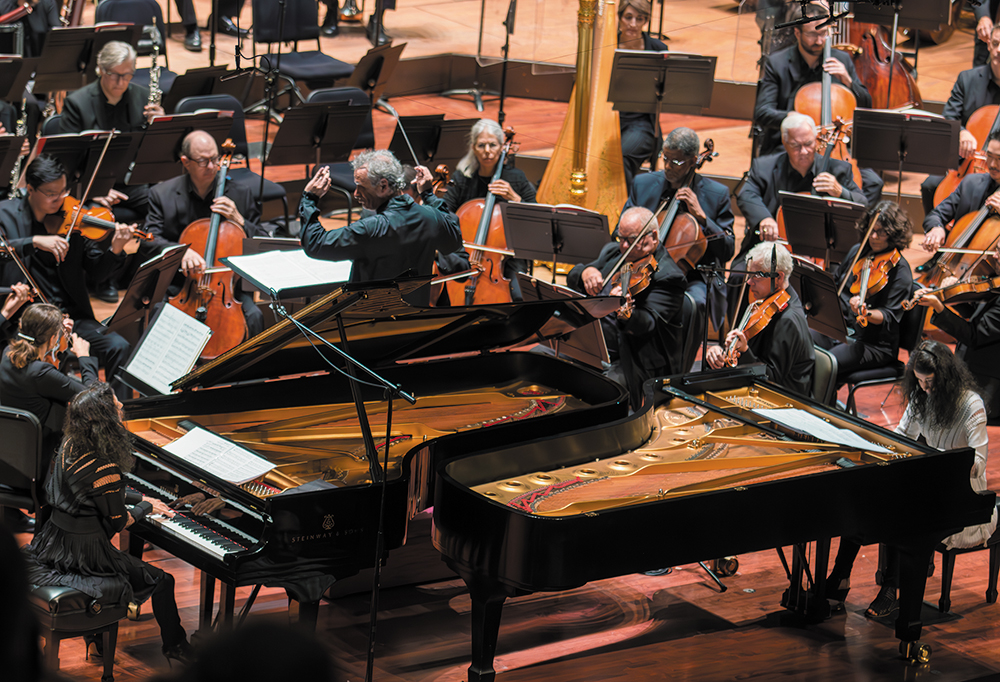
Much of that connection, Langrée posits, comes from the composer writing for specific musicians he knows well. “Bryce is very close friends with Katia and Marielle, which is also why he now has a house in the country near them,” he says. “His new concerto he wrote specifically for Alice Sara Ott. This is when musicians become part of the creative process. They are not merely playing a piece, but have become the composer’s voice.”
■ ■ ■
Perhaps even more directly, soprano Latonia Moore—Anthony Davis’ own choice as soloist—will also become his surrogate voice. And much like Dessner’s new concerto, which caps his relationship with the CSO, the world premiere of Davis’ song cycle evolved from a fruitful association with Langrée and the Orchestra.
Langrée first discovered Davis’ clarinet concerto You Have the Right to Remain Silent during the Covid pandemic. In terms of a Davis revival, the CSO’s virtual performance was arguably second only to the composer’s 1986 opera X: The Life and Times of Malcolm X (originally premiered at New York City Opera) finally making it to the Metropolitan Opera in 2023.
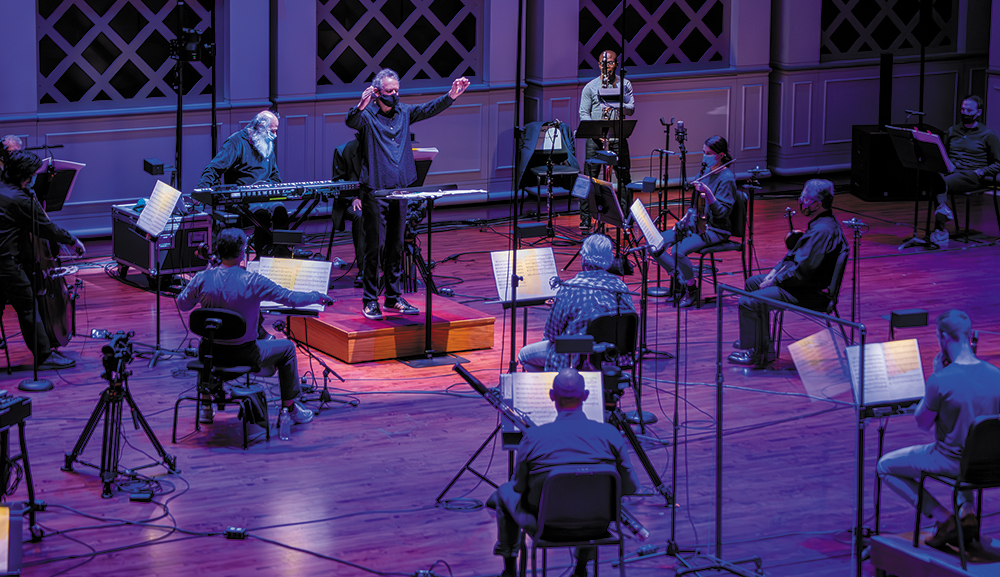
“It was during the pandemic that my assistant Tyler Secor brought me Anthony’s score and told me I should read the piece,” Langrée recalls. “In the beginning I thought, well, it was Covid. We were all silent. I found it very philosophical: Is music a form of silence? Can silence be music? And Tyler said, ‘No, it’s not about that at all.’”
Rather, Davis’ 2010 piece recounts his experience in the 1970s being stopped by the police and held at gunpoint for 45 minutes because he matched the description of a robbery suspect. Davis immediately had a solo instrument and scenario in mind: “The idea is that the orchestra is interrogating the clarinet,” he explains. The piece later became the basis for the composer’s 2020 Pulitzer Prize-winning opera The Central Park Five.
“I thought, this piece is so strong, so powerful. Why isn’t it performed more?” Langrée recalls. “I’m very proud that the New York Philharmonic has now programmed it, as has the Boston Symphony and several other orchestras. Through our presentation, the piece was given a second life.”
Much of the power in the CSO’s performance, Langrée claims, was due to the presence of former CSO musician Anthony McGill, now principal clarinetist of the New York Philharmonic. (“Anthony was still friends with the musicians, not a star soloist coming down from Olympus,” he adds.) But Langrée gives even more credit to having the composer on hand during rehearsals.
“On a human level, Anthony is very generous and patient when something doesn’t work,” he says. “He’s also very pragmatic. Being a performer himself, he gives very simple and essential advice that brings you into his world with very few words. The Orchestra could respond to him both as a composer and jazz player. Let’s not forget that the CSO recorded an LP with Duke Ellington. One specific trait of this Orchestra is that they speak many musical languages fluently, without accent.”
■ ■ ■
CSO musicians and audiences look ahead with yet another new piece, with Langrée conducting former CSO resident composer Jonathan Bailey Holland’s Assemble on April 20 and 21, a week after he leads the piece’s world premiere with the Los Angeles Philharmonic. “Assemble is literally about assembling instrumental groups in the orchestra,” Langrée says, “starting with the percussion.”
Filling the program, though, is more unfinished business. After Schoenberg’s lush, post-Romantic Transfigured Night, the performance draws to a close with Augustin Hadelich performing Brahms’ Violin Concerto. “Augustin has always been an ideal partner,” Langrée claims, “because he considers himself a colleague of the orchestra.” Hadelich’s first collaboration with Langrée and the CSO was Berg’s Violin Concerto in 2016, followed by Barber’s Violin Concerto and Ravel’s Tzigane in 2019. The next year, the violinist returned with the Violin Concerto by Joseph Bologne, Chevalier de Saint-Georges. “So, after covering the 20th and 18th centuries, we finally get around to filling in the 19th,” Langrée adds.
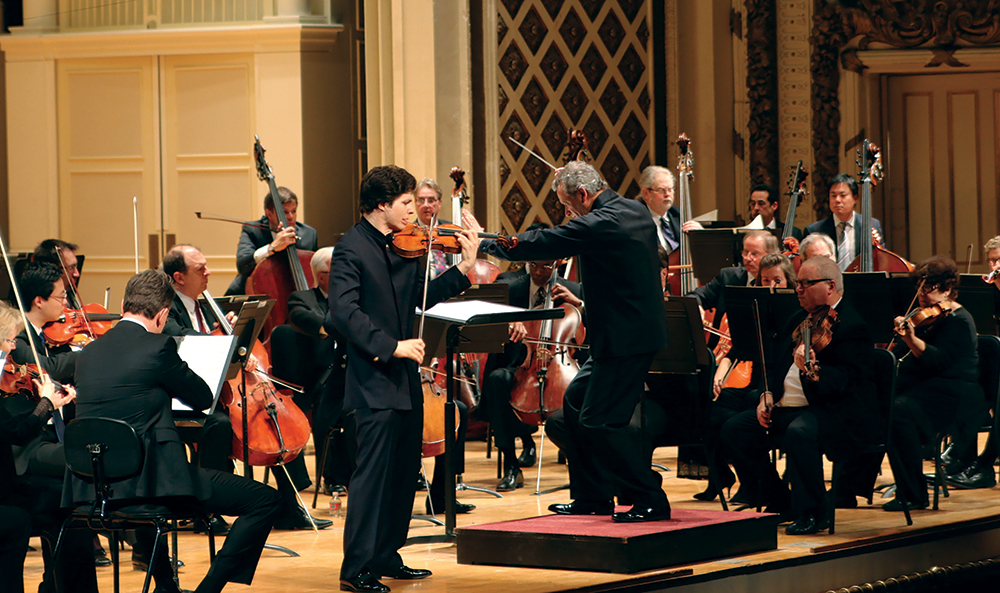
Filling the gaps in other CSO lineups, though, is Beethoven, which Langrée defines in part as classical music’s default programming. “Beethoven is the root of any orchestral sound,” he says, “but given the German history here, it’s particularly the case in Cincinnati.”
The key question, though, is which Beethoven. To match Dessner’s Mari and Piano Concerto, Langrée has chosen the Seventh Symphony “mostly for its driving rhythms.” For his final concerts, Langrée will open the program with the Leonore Overture No. 2. “First of all, this is the overture to an opera, and I have wonderful memories of performing opera with the Orchestra, from Hamlet most recently to La bohème with Cincinnati Opera in 2017,” he says. “Second, it is about this particular opera.”
Whether in its early incarnation as Leonore, which he led in Lausanne, or as Fidelio, which he conducted at Glyndebourne—or even alternating between the two, as he did at Paris’ Théâtre des Champs Élysées—Beethoven’s only opera has long been close to Langrée’s heart. “As either Leonore or Fidelio, the opera speaks about freedom and equality,” he says. “The mission of this Orchestra is not just to present beautiful music, but to give it meaning, to use music to bring people together. Beethoven uses music to address a humanistic message to the world.”
In that regard, he adds, Beethoven and Davis have much in common. “After so many decades, Anthony Davis’ music remains powerful because many of its social concerns are still valid,” he continues. “I would say the same about Beethoven. Great pieces stand the test of time because, even when the syntax changes, the message is still about the human condition. Beethoven’s music still speaks to us today because our problems are still the same.”
